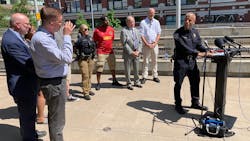Metro Transit kicks off Transit Service Intervention Project
Metro Transit launched its Transit Service Intervention Project on June 1, which is a coordinated effort between local, state and community-based organizations to extend social services outreach to populations who may benefit from them and enhance Code of Conduct enforcement on transit.
Funding for the $2-million program was provided in the Minnesota Transportation Omnibus bill that was signed into law at the end of May. The project will operate for at least 12 weeks, with outreach events at the Target Field, Lake Street/Midtown, Mall of America, Central and Union Depot stations.
Metro Transit is expected to issue a request for proposals the week of June 5 for community-based groups to submit plans to support the project.
“Metro Transit is part of the communities we serve and many of the challenges facing our region, such as homelessness and addiction, become visible on our transit system,” said Lesley Kandaras, Metro Transit’s interim general manager. “The Transit Service Intervention Project will bring together partners who can join us in meaningfully addressing challenges that are bigger than a transit agency alone can solve.”
The June 1 launch event at Target Station was the first of at least one dozen events Metro Transit is planning as part of the project. Social service workers and officers from the Metro Transit Police Department’s Homeless Action Team (HAT) participated in the event. Metro Transit says its HAT officers have been “familiar and trusted allies” who have worked alongside partners for years. The agency reports HAT officers have also helped place more than 200 families in stable, long-term housing through referrals to the Met Council’s Housing and Redevelopment Authority (HRA).
“Our HAT team has done a commendable job building trusting relationships with people who look to transit for shelter and with all the partners who are the experts in their areas,” Metro Transit Police Chief Ernest Morales III said. “Elevating and building on that work will not only provide immediate help but allow all of us to find new ways of working together on an ongoing basis.”
Wide-reaching safety efforts
The service intervention project supports the Metropolitan Council endorsed Safety & Security Action Plan, which was approved in 2022 and includes 40 action items developed with input from riders and staff.
Metro Transit reports that all the actions in the plan are advancing, including the use of supplemental security, improvements to facilities and expanded use of real-time cameras.
The safety and security plan hinges on increased presence of officials on the transit system. Metro Transit has increased wages for police officers and community service officers and continues its recruitment efforts to fill 60 open positions. While positions remain unfilled, Metro Transit explains police officers, as well as law enforcement partners, will be spending more time on transit over the coming months.
The newly signed Transportation Omnibus bill also affords several safety and security changes for Metro Transit, including the creation of an alternative to police-issued misdemeanor citations for fare non-compliance. Through a new program, non-police personnel could issue administrative citations handled outside of the courts. The program will launch after policies and procedures are finalized by the Met Council this year.
The legislation also requires cleaning standards to be adopted and for an updated Code of Conduct to be brought to the Met Council for its endorsement. Future investments in public safety can be supported through a metro-area sales tax that will take effect this fall.
“The state has made an historic investment in transit, and in doing so, has made it clear it is really incumbent on us to operate a system that is clean, safe and welcoming to all,” Met Council Chair Charlie Zelle said. “We are eager to rise to the occasion.”
About the Author

Mischa Wanek-Libman
Group Editorial Director
Mischa Wanek-Libman is director of communications with Transdev North America. She has more than 20 years of experience working in the transportation industry covering construction projects, engineering challenges, transit and rail operations and best practices.
Wanek-Libman has held top editorial positions at freight rail and public transportation business-to-business publications including as editor-in-chief and editorial director of Mass Transit from 2018-2024. She has been recognized for editorial excellence through her individual work, as well as for collaborative content.
She is an active member of the American Public Transportation Association's Marketing and Communications Committee and served 14 years as a Board Observer on the National Railroad Construction and Maintenance Association (NRC) Board of Directors.
She is a graduate of Drake University in Des Moines, Iowa, where she earned a Bachelor of Arts degree in Journalism and Mass Communication.
